This section offers a snapshot of UK activism at the time. Engaging interviews with people living in the borough reveal their reflections and memories.
The Liberation War of Bangladesh was not just fought in the Bengal delta. By 1971 a small but growing Bengali community was established in the UK, including in Tower Hamlets.
During war, the community played an important role. They highlighted the atrocities taking place in Bangladesh. They lobbied the British Government and the international community.
Fundraising for refugees as well as Bengali freedom fighters also played a key part. It is said that some people donated their entire week’s salary.
One woman donated her entire wedding gift of gold jewellery. Many went to Bangladesh via India to assist in the struggle and join in the fight to free Bangladesh.
Tunu Miah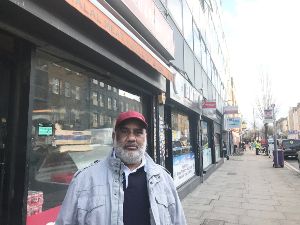
Tunu Miah was a boy at the time. He spoke of his experiences in 1971 by saying,
“I was a school student at that time. I was living in Brick Lane, and studying at the Montefiore Secondary School, now named Osmani School. I was year 5 student at that time, and then the Independence War started.
We were few in numbers at that time, my father and many other people who led, joined the independence movement. I also joined the movement and participated as much as I could.
I was very much sensitive about my country, my language, because the Pakistanis treated us very badly as if they were superiors and we were their servants. I could not tolerate that. So, as the independence movement started, we all joined in.
Huge number of people joined the campaign, we were all involved, as we were a bit young, we were not in the front line, but we supplied the elders with sticks, in case of any trouble.”
He talked about the difficulty of communication with Bangladesh from the UK during the war. “We had no direct communication with Bangladesh, there were no letters coming. At the beginning, a few letters came, but in the end, there were no letters. At that time, some men came to the UK, first going to India or Pakistan, and then coming to UK. We all went to see anyone who came from Bangladesh, maybe he is not from my village, or even from my district but still everybody wanted to meet him. We all gathered around him to get the latest news of Bangladesh.”
On the final victory he said, “I am very much proud of my homeland, Bangladesh. I can’t explain exactly how much proud I felt when we got the victory! I can’t define my emotions in words”
(Extract from an Interview conducted by Jamil Iqbal and Ansar Ahmed Ullah for Swadhinata Trust on 17 January 2006.)
Tunu Miah mentioned pro-Bangladesh liberation meetings and activities taking place in most Bengali households in Tower Hamlets. Bengalis would also gather in many venues such as Bangladesh Welfare Association, Dilchad Restaurant in Artillery Lane, Oriental Travel agency opposite Brick Lane Mosque and the Sonal Bangla restaurant in Hanbury Street.
He remembers hearing the news of Pakistan’s surrender and celebrating by eating out with a friend at a restaurant called Brick Lane Yard, off Old Montague Street. On reflection, Miah is pleased to learn that Bangladesh is now considered a developing country with huge projects being realised. (Talking to Ansar Ahmed Ullah, Swadhinata Trust on 6 March 2021)
Abdus Sami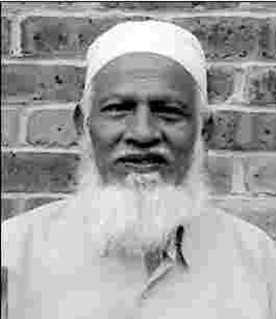
Abdus Sami lived in Chicksand Estate and remembers one of the biggest demonstrations held at Hyde Park. He donated money and campaigned against the Pakistani military rule in Bangladesh.
He cited the Bengali language issue as the first seed of resentment, “Our country was East Pakistan in those days. We demanded Bengali to be the state language. It divided us (East & West Pakistan), and the friction begun. We had to fight with them because of this demand. The fight of state language became bigger and bigger. Afterwards, the Agartala incident took place and Sheikh Mujib declared independence.”
On mobilisation, he said, “We demonstrated in Hyde Park on so many occasions. We also contributed money for the war. I personally gave £100, and, on another occasion, I gave £50 as donation for the War in Bangladesh. We went to Hyde Park by coach from Whitechapel and people from all regions came to Hyde Park. People came from Birmingham, Manchester, Oldham, and Bradford and so on. Huge number of people gathered. I think people wouldn’t respond today the way they did in 1971 in the UK. They did it for the country, for the people who were being killed and massacred by the Pakistani Army. Everyone was for independence and for an independent Bangladesh.”
(Extract from an interview carried out by Jamil Iqbal for Swadhinata Trust on 12 June 2006)
Val Harding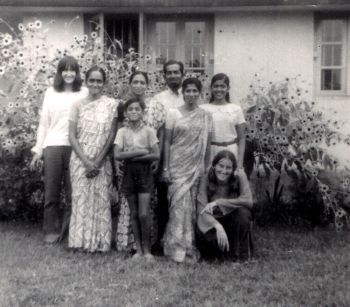
In 1971 Val Harding worked as a nurse in the Bangladesh Refugee Camps in West Bengal. When the war broke out, she was volunteering in a hospital in Nepal. On hearing the news of the war, she decided to help with her qualification as a nurse. She went to Kolkata and participated in the Cathedral Relief by joining a medical team caring for the wounded.
“I volunteered for an Indian organisation, Cathedral Relief Service, that was based in Kolkata. I worked with a mobile medical team in Kalyani district, West Bengal, that travelled between nine large camps spread out over the area.
I distributed medicines and dressed wounds. I also helped organise activities for children in the camps, including games and drawing and painting activities.
I was involved in fund raising from the UK, when local groups here fundraised and sent us donations. We used these donations to buy clothing for children and other everyday items that families needed”.
(Val Harding talking to Ansar Ahmed Ullah, Swadhinata Trust on 8 March 2021).
South London’s Val Harding is now a trustee with the Swadhinata Trust.
A key feature of this period was also the support provided by members of the white British majority.
Peter Shore, MP and Donald Chesworth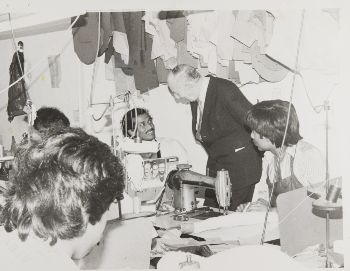
The genocidal attack on 25 March 1971, led UK Bengalis to organise protest rallies in major cities of the UK including a huge rally on 4 April in London’s Hyde Park. A memorandum was submitted to Prime Minister Edward Heath’s office at 10 Downing Street.
Notable figures such as Tower Hamlets MP Peter Shore and the Warden of Toynbee Hall Donald Chesworth supported Bangladesh’s struggle for independence in 1971. The Bangladesh Government formally recognised their contribution by honouring them in 2012.
On 24 April, at a meeting held at Coventry, the Steering Committee of Bangladesh Action Committee for the People’s Republic of Bangladesh was formed with Justice Abu Sayeed Chowdhury as Chairman. They also formed a Trust Fund with Justice Abu Sayeed Chowdhury, John Stone House MP and Donald Chesworth as Trustee.
Donald Chesworth, the Chairman of War on Want, organised a trip to Bangladesh in May 1971. The delegation comprised of himself and three others including Bruce Kent, chairman of CND, and a Roman Catholic priest, John Horgan. The visit was humanitarian and the delegation went to places like Swandip in Chittagong. They also met members of the Bangladesh Government in exile.
Peter Shore MP, also visited Bangladesh. He was outraged by what had happened, having been well informed by many of his constituents. The Bengali community gave him first-hand accounts of what their families and relatives were enduring.
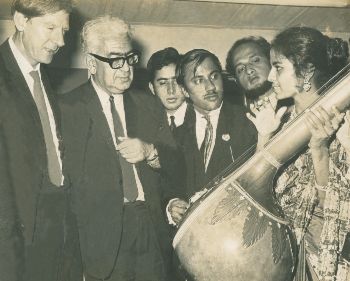
Following his visit to Bangladesh, he reported his findings to the House of Commons. Through debates, questions and Early Day Motions, the issue was kept alive.